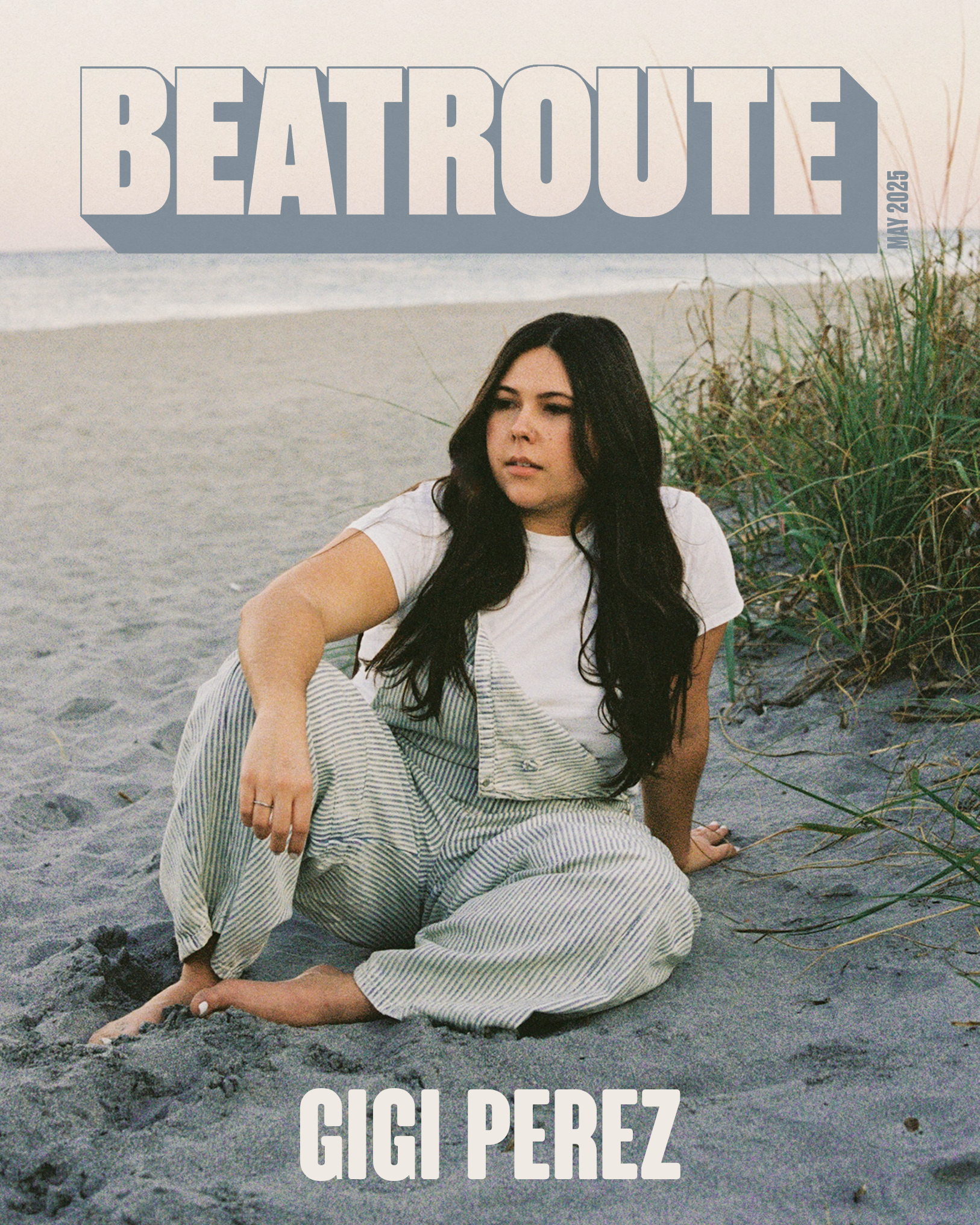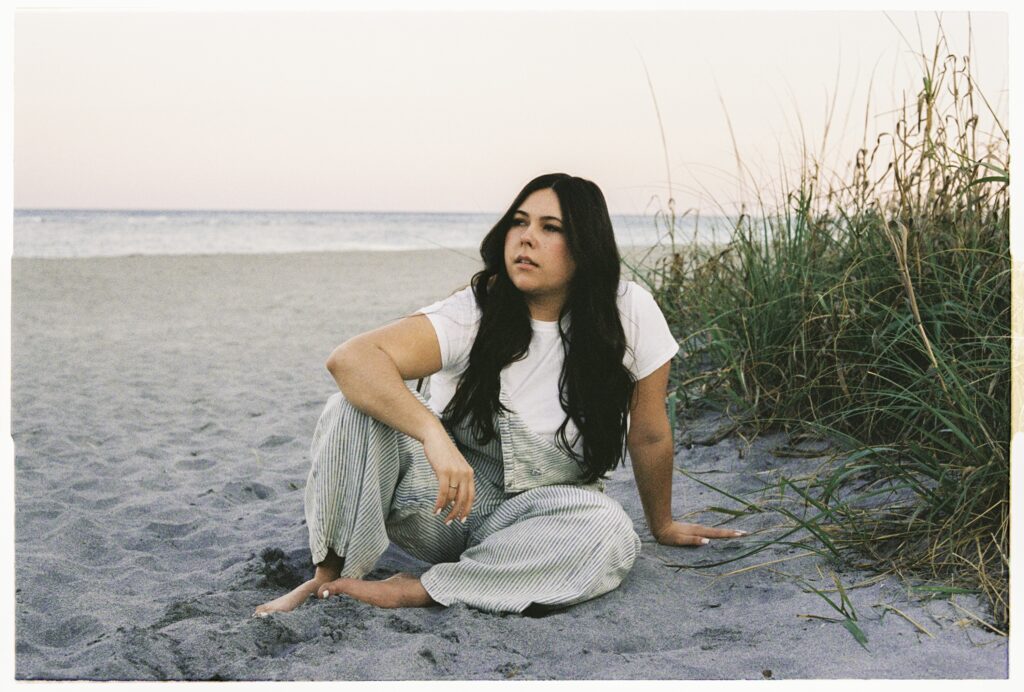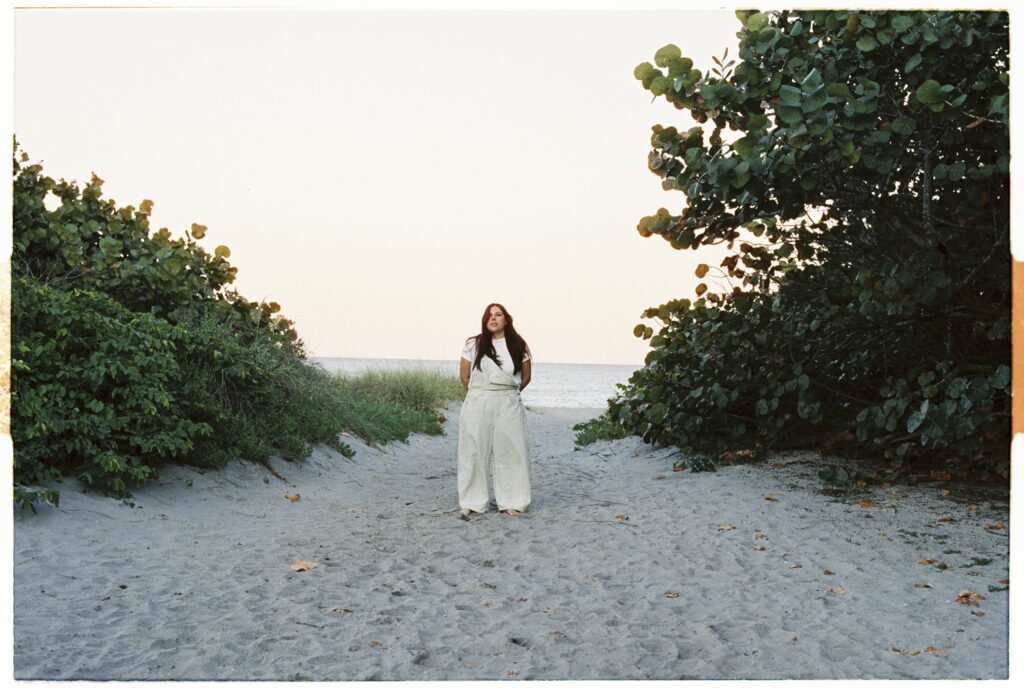COVER
Gigi Perez
Where Joy Meets Grief
By Sophie Cino
Publishing date: May 08, 2025
G
Grief just felt like absence. But as I got older, it hit me in new ways. The uncertainty, the loss—especially as more people around me pass away. I’ve been trying to unpack it and find peace.” Gigi Perez reflects, her voice quiet but certain as she joins me on Zoom from somewhere she’s stopped on tour. A faint sound from a glitch on the call breaks the quiet for a moment—an ordinary interruption that somehow fits the intimacy of a conversation about faith, loss, and the music that helped her make sense of it all.
Her debut full-length album has just dropped, At the Beach in Every Life, a project that feels less like a career milestone and more like a diary. “This is the album I didn’t even know I needed to write,” she says. “It’s not the record I would’ve made five years ago. It’s the one I had to make right now, because it came out of questions I couldn’t ignore anymore.”
Questions like: What does it mean to keep showing up for love, even after losing so much? What does spirituality look like when the version you were raised on no longer fits? And, perhaps most poignantly: How do you hold joy in one hand and grief in the other without dropping both?
Grief just felt like absence. But as I got older, it hit me in new ways. The uncertainty, the loss—especially as more people around me pass away. I’ve been trying to unpack it and find peace.” Gigi Perez reflects, her voice quiet but certain as she joins me on Zoom from somewhere she’s stopped on tour. A faint sound from a glitch on the call breaks the quiet for a moment—an ordinary interruption that somehow fits the intimacy of a conversation about faith, loss, and the music that helped her make sense of it all.
Her debut full-length album has just dropped, At the Beach in Every Life, a project that feels less like a career milestone and more like a diary. “This is the album I didn’t even know I needed to write,” she says. “It’s not the record I would’ve made five years ago. It’s the one I had to make right now, because it came out of questions I couldn’t ignore anymore.”
Questions like: What does it mean to keep showing up for love, even after losing so much? What does spirituality look like when the version you were raised on no longer fits? And, perhaps most poignantly: How do you hold joy in one hand and grief in the other without dropping both?

 Perez, grew up in West Palm Beach, Florida, raised in a Christian household with music pulsing through her life in both sacred and secular forms. After being released from her first record deal—a gut punch she describes with both grace and rawness—she started over. “I was in my parents’ house again, and I thought, ‘Well, I’ve always wanted to produce my own stuff. I guess this is the time.’”
Perez, grew up in West Palm Beach, Florida, raised in a Christian household with music pulsing through her life in both sacred and secular forms. After being released from her first record deal—a gut punch she describes with both grace and rawness—she started over. “I was in my parents’ house again, and I thought, ‘Well, I’ve always wanted to produce my own stuff. I guess this is the time.’”
She dove headfirst into recording and production, self-teaching with the help of YouTube tutorials, Reddit threads, and a few generous friends. That independence wasn’t just technical—it was spiritual. At the Beach in Every Life sounds like an artist who’s finally claimed every inch of her voice.
The album itself is full of softness and ache, somewhere between indie rock and dream pop, anchored by lyrics that don’t shy away from God or death or romantic devastation. In “Sailor Song,” the viral hit that catapulted her into broader recognition, Perez sings, “I don’t believe in God, but I believe that you’re my savior”—a line that she nearly didn’t write, out of fear.
“I had just gotten back from the beach,” she says, smiling a little. “It was one of those days where the ocean feels like it’s talking to you. I was wrestling with everything I’d been taught to believe and what I actually felt. Writing that lyric felt like putting something forbidden on the table. But when I did, I felt relief.”
That theme—putting the unspoken into language—is the heart of her songwriting. And it’s part of why she can’t seem to help being vulnerable, even when it terrifies her. “After I lost my sister, I kept looking for music that would tell me what I was feeling. I needed someone to say it first. That’s what I try to do now. I’m not afraid to be the one to say it first.”

There’s a lyric tucked in the closing track that gives the album its name: “If all my dreams come up empty and I wash up on the shore, you would find me at the beach in every life through every door.” It’s a line written hours after Perez learned about her label dropping her—yet it radiates something close to peace.
“The beach to me has always been that line between joy and grief,” she explains. “It’s where I went when I had nowhere else. It’s where I mourned. But it’s also where I felt alive again.”
When asked how she prepares for this next chapter—touring festivals like Osheaga, opening for Hozier—she laughs softly. “Honestly? We play Celia Cruz ‘La Vida es un Carnaval’ before every show. It’s my grandma’s favorite. We used to dance to it at barbecues. Now I play it with my band before I go out on stage, and it reminds me: life is meant to be lived. Even when it’s heavy.”
Success, for Perez, isn’t measured in streams or stadiums—though she’s starting to see both. “It’s the people who write to me after shows. Who say, ‘I lost my sister too. I felt this song in my bones.’ That’s the measure. That’s the only thing that matters.”
And if she could talk to the 15-year-old version of herself, what would she say?
Perez pauses. Her answer lands gently.
“I think I would tell her that you are capable of living a beautiful life, even if it’s not easy.”
